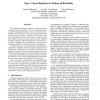Free Online Productivity Tools
i2Speak
i2Symbol
i2OCR
iTex2Img
iWeb2Print
iWeb2Shot
i2Type
iPdf2Split
iPdf2Merge
i2Bopomofo
i2Arabic
i2Style
i2Image
i2PDF
iLatex2Rtf
Sci2ools
166
click to vote
ISCA
2012
IEEE
2012
IEEE
Viper: Virtual pipelines for enhanced reliability
The reliability of future processors is threatened by decreasing transistor robustness. Current architectures focus on delivering high performance at low cost; lifetime device reliability is a secondary concern. As the rate of permanent hardware faults increases, robustness will become a first class constraint for even low-cost systems. Current research into reliable architectures has focused on ad-hoc solutions to improve designs without altering their centralized control logic. Unfortunately, this centralized control presents a single point of failure, which limits long-term robustness. To address this issue, we introduce Viper, an architecture built from a redundant collection of fine-grained hardware components. Instructions are perceived as customers that require a sequence of services in order to properly execute. The hardware components vie to perform what services they can, dynamically forming virtual pipelines that avoid defective hardware. This is done using distributed co...
| Added | 28 Sep 2012 |
| Updated | 28 Sep 2012 |
| Type | Journal |
| Year | 2012 |
| Where | ISCA |
| Authors | Andrea Pellegrini, Joseph L. Greathouse, Valeria Bertacco |
Comments (0)

